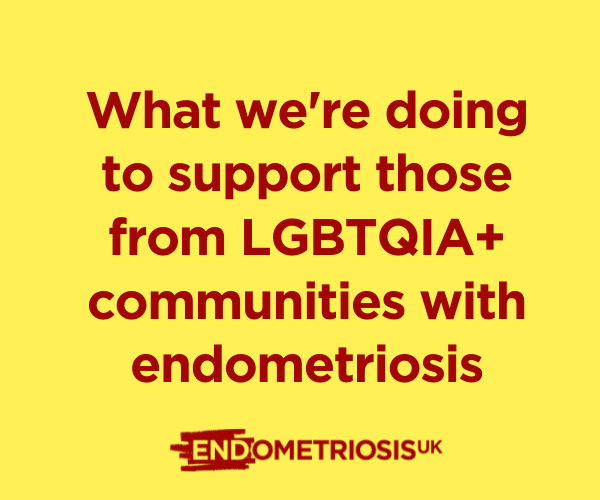June is Pride Month – a time to celebrate everyone within our community who are LGBTQIA+.
While Pride Month is a time for celebration, it is also an important reminder to reflect on our work as an organisation and how we must continue to demand change. As an organisation, we are committed to supporting and advocating for everyone affected by endometriosis, regardless of race, gender identity, class, sexual orientation, or disability, and ensuring diversity, equality and inclusion is at the heart of every aspect of our organisation. Here’s what we’re already doing, and how we’ll continue to call for change.
We campaign.
We campaign by working with Governments, healthcare practitioners and NHS decision makers across the UK to demand change, and continue to raise the voices of those from LGBTQIA+ communities.
Too often, those from LGBTQIA+ communities have their pain ignored, symptoms dismissed, and experience undermined. Nobody should face discrimination in accessing care.
Discrimination towards LGBTQIA+ communities remains commonplace, with many facing significant barriers in accessing endometriosis care. This must change, and more must be done to tackle inequalities and ensure everyone with endometriosis is listened to and believed, and signposted to the relevant care and support.
It has been shared with us that, all too often, those with endometriosis in the LGBTQIA+ community hear comments that invalidate or undermine their experience of endometriosis and its symptoms, this may include comments relating to sexual experience or gender identity. This must become a thing of the past if we are to ensure everyone with endometriosis has access to the right care at the right time.
Within Government reports and submissions, we have called for, and continue to call for:
- Governments to address health disparities for those from LGBTQIA+ communities and take action on this. As part of this, Governments should look to end and address data gaps
- All healthcare practitioners to ensure decisions are made in collaboration with patients, ensuring the needs and wishes of individual patients are discussed and followed
- The NICE Quality Standards on Endometriosis to be followed, to ensure that those with endometriosis from LGBTQIA+ communities do not face discrimination or feel uncomfortable in accessing care. In particular, those with endometriosis who do not identify as female should be provided the opportunity to be seen in another clinic or setting, in line with their individual preference. The NICE Quality Standards state: “Some transgender men may find it distressing to attend appointments in a women's hospital or dedicated women's unit and may need to be seen in another clinic or setting. When transgender men have an inpatient stay for endometriosis, they may need to stay in a male, non-gynaecology ward, in line with their preference”. This should always be followed.
- Healthcare practitioners to receive appropriate training and ensure everyone is treated with the respect they deserve. All healthcare practitioners should provide inclusive healthcare, including the use of inclusive language and for decisions to be made in collaboration with patients and their individual needs and wishes. The NICE Guideline on Information about making decisions about your care should be followed.
As part of our work to support those from LGBTQIA+ communities, we:
- Have formed an EDI working group which focuses on improving our EDI work
- Are working with members of LGBTQIA+ communities, and have worked with Diverse Matters who ran a series of focus groups on our behalf so we can greater understand the challenges faced by those within LGBTQA+ communities, and act on these as an organisation. Outcomes included specific health information for communities.
- Are creating an Equality, Diversity & Inclusion group with representatives from LGBTQIA+ communities. This group will be sharing their perspectives and lived experiences to help ensure the inclusivity and accessibility of Endometriosis UK projects and initiatives. If you are interested in getting involved in helping us to develop this area of our work, please get in touch.
- Are delivering Annual Equality, Diversity and Inclusion volunteer training beginning in October. Training will include ensuring your support group is inclusive, being aware of your unconscious bias and supporting as an ally.
- Are delivering targeted volunteer recruitment within LGBTQIA+ communities, increasing representation amongst volunteers and also service users.
- Are improving our information for those from LGBTQIA+ communities


